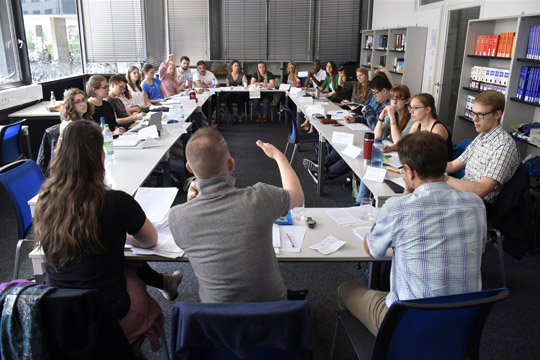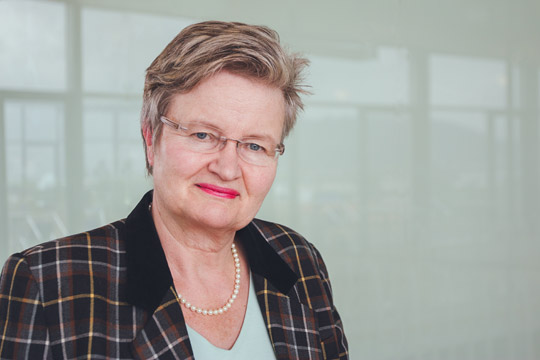Impetus for teaching
Freiburg, May 20, 2020
More autonomy, greater quality in teaching: The University of Freiburg has successfully completed the system accreditation process without further conditions. The university can now set the accreditation council seal of approval on its own more than 200 degree programs. The process promises to provide new impetus for the university’s entire spectrum of studies and teaching.
 The University of Freiburg is now entitled to assess the quality of its own more than 200 degree programs - and that should benefit students above all. Photo: Thomas Kunz
The University of Freiburg is now entitled to assess the quality of its own more than 200 degree programs - and that should benefit students above all. Photo: Thomas Kunz
As Vice-President for Academic Affairs, Professor Juliane Besters-Dilger has since 2016 been the driving force behind the University of Freiburg’s effort to earn system accreditation rights. This allows the University to independently award the accreditation quality seal - and at the same time serves as proof of quality teaching at the university as a whole. The procedure has now been successfully finished without any conditions and the changeover has been completed. “We are no longer dependent on external agencies; now we can better take into account the goals and special features of each subject and strengthen our joint responsibility for the teaching and design of our degree programs,” Besters-Dilger says.
The central decision-making body in the new process in the Internal Accreditation Committee (IAA), to which each faculty sends eight delegates - two teaching staff, two representatives of the mid-level academic staff, two administrative or service and technical staff members, and two students. The individual accreditations are each supervised by five IAA members and at least three external supervisors. This group jointly evaluates the degree program and makes a recommendation to the IAA directorate, which reviews it again and passes it on to the Rectorate for a decision.
A change of role is expected to lead to acceptance
The high internal participation is one of the special things about Freiburg, says Sebastian Neufeld. Neufeld, a student in the Neuroscience Master’s program, has been a member of the IAA directorate for about a year and has been involved as an external student reviewer since 2017. “We get many members of the university involved, but this makes the system fairly labor-intensive,” he says. “I am curious to see how it goes.” The idea is to enable a change of roles that will increase acceptance within the university, explains Stefanie Haas of the university’s Quality Management Studies and Teaching office - QM department for short - which organizes and helps manage the process. “Members from the faculties take on different roles in the process - as representatives of a subject that is under review, as reviewers who review other programs, and as members of the IAA directorate who look at the process from a broader perspective.”
Dirk Niethammer is one of the university members who have already undergone the role-switching process. As a faculty assistant, he experienced internal accreditation procedures at the Faculty of Environment and Natural Resources from the perspective of the peer reviewer; as an IAA reviewer, he later evaluated sports science courses. “As a reviewer, I initially had reservations about how critical I should be of colleagues from other programs,” he reports. “But my experience was that constructive criticism was appreciated and that it is worthwhile being open with each other.” Sebastian Neufeld also sees no problem with reviewers from a different subject. “You can get a coherent overall picture even without deeper knowledge of the respective discipline - especially since the reviewing group also has specialist expertise provided by its external members.” He has always been able to bring in his student perspective. Ultimately, all those involved benefit from the exchange, Professor Evelyn Ferstl confirms. She is the head of the IAA directorate. “It is a pleasure to work in this interdisciplinary committee and to receive input from other subjects,” she says.
Placing the focus on content
Now that system accreditation has been established, the administrative workload for the disciplines will also be reduced. “The procedure is an extremely complex process, but the QM department is wonderfully organized,” says Ferstl, “it is a boon for the entire university to have these skills gathered together in one team. The subject areas no longer write time-consuming reports, as the QM department compiles detailed material on the programs by processing data such as duration of study, success rates and the results of surveys of students and graduates, in its reports. The subjects supplement these documents with comments on the reports as well as the current study and examination regulations and the module handbooks, which provide information on the contents and learning objectives of the modules. “The QM department provides input throughout the entire process, can be contacted at any time and advises those involved as to what they should concentrate on,” Niethammer says. “Reviewers and assessors can thus focus much more on the contents.”
 Reinforcing common responsibility for teaching - As Vice-President for Academic Affairs, Professor Juliane Besters-Dilger was the driving force behind the University of Freiburg’s effort to earn system accreditation rights. Photo: Sandra Meyndt
Reinforcing common responsibility for teaching - As Vice-President for Academic Affairs, Professor Juliane Besters-Dilger was the driving force behind the University of Freiburg’s effort to earn system accreditation rights. Photo: Sandra Meyndt
Neufeld thinks that the students involved are nevertheless faced with a special challenge. “It takes a well-founded analysis of the topic to be able to effectively assess degree programs. But by the time someone reaches the point of being able to make a powerful contribution, they have usually already reached the end of their studies.” He therefore welcomes the fact that the QM department is organizing a training program for students - as well as for the other status groups. He also hopes that the student councils will take the opportunity to get involved when the representatives of a subject comment on the documents. “After all, we students are the ones who benefit from the quality of teaching - or we are the ones who suffer,” he says.
Ombud procedures for conflict resolution
In addition to the IAA members, external reviewers are also involved. At least two university lecturers and at least one representative from professional practice. They are nominated at the suggestion of the respective faculty. “We check for any possible bias,” says Besters-Dilger. “But in their own interest, the faculties suggest respected persons from whom they hope to gain valuable input.” But what does it mean for the university's internal climate when the Rectorate ultimately decides on the accreditation of the faculties’ degree programs? “At first there was certainly a fear that new areas of conflict might arise,” says Niethammer. Ferstl also confirms this - but says experience shows that “the procedure has the character of a joint discussion between the Rectorate and the faculties. I do not believe that there will be many cases of conflict.” And if there are problems? “Then there is an ombudsman procedure, which has been used before and has proven useful.” So far, about 30 programs have gone through the procedure - all of them have received the quality seal.
It is planned that each Bachelor’s and Master’s degree program at the University of Freiburg will be reviewed every eight years. “However, we will also assess other programs that are not subject to accreditation because they also see a chance to improve their quality,” says Birke Reichert from the QM department. The university is initially system-accredited for six years; there will be regular external reviews to ensure it remains entitled to award the seal of quality for its degree programs. “Acceptance of the process is high, and at the same time we want to further improve it by, for example, optimizing the ratio of effort and results, among other things through increasing digitalization” says Dr. Sören Pape, head of the QM department. Although the overall cost for the university has risen in comparison to the program accreditation, the investment is worthwhile, emphasizes Juliane Besters-Dilger. "The joint quality assurance and the significantly increased quality awareness add value to our entire university,” she says. Evelyn Ferstl, head of the IAA directorate, agrees. “It was a good decision and strengthens the autonomy of the university,” she says.

